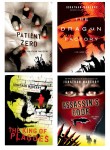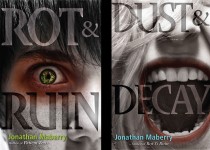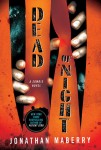Dead of Night by Jonathan Maberry
“This is the way the world ends. Not with a bang…but a bite.”
In NY Times bestseller Jonathan Maberry’s latest thriller, DEAD OF NIGHT, a prison doctor injects a condemned serial killer with a formula designed to keep his consciousness awake while his body rots in the grave. But all drugs have unforeseen side-effects. Before he can be buried, the killer wakes up. Hungry. Infected. Contagious. Small town cop Dez Fox and her partner JT are caught in a wave of murder as everyone they know and love die…only to rise again as the ravenous living dead. If Dez and JT can’t contain the plague inside the town limits, the infection will spread beyond all control.
Jonathan Maberry is a NEW YORK TIMES best-selling and multiple Bram Stoker Award-winning author, magazine feature writer, playwright, content creator and writing teacher/lecturer. His books have been sold to more than twenty countries. He’s also the most prolific author I’ve ever met:
His novels include the Pine Deep Trilogy: GHOST ROAD BLUES (Pinnacle books; winner of the Bram Stoker Award for Best First Novel in 2006), DEAD MAN’S SONG (2007) and BAD MOON RISING (2008); the Joe Ledger series of action thrillers from St. Martins Griffin: PATIENT ZERO (2009, voted one Best Zombie Novel of 2009; winner of the Black Quill Award and a Bram Stoke Award finalist), THE DRAGON FACTORY (2010; now available), THE KING OF PLAGUES (2011), ASSASSIN’S CODE (2012), EXTINCTION MACHINE (2013); THE WOLFMAN (NY Times bestseller from Tor and winner of the Scribe Award for Best Adaptation, based on the Universal Pictures film starring Benecio Del Toro, Emily Blunt and Sir Anthony Hopkins); the Benny Imura series of Young Adult dystopian zombie thrillers from Simon & Schuster: ROT & RUIN (2010) and DUST & DECAY (August 30, 2011), FLESH & BONE (2012) and FIRE & ASH (2013); and the zombie thriller DEAD OF NIGHT (October 2011).
Recently, I caught up with Jonathan between appearances, signings, seminars and marathon writing sessions and asked him about his latest thriller:
You’ve been including zombies in your work for years – what keeps drawing you back?
The zombie storytelling trope is incredibly elastic. Unlike vampires, zombies have no personality and therefore don’t intrude into the development or interaction of the central human characters. Zombies are metaphors for some massive, shared threat which all of the characters share. Once introduced, the zombies can fade a bit to the background so that the main bulk of the story is about people in crisis. And, let’s face it, the core of all fiction is good people having a bad day.
Also, zombies allow a writer to dig into shared fears without necessarily addressing them outright. A lot of people would not pick up a book about the global economic collapse, or relentless consumerism, or racism, or other real-world issues. And yet they’ll read a zombie novel or watch a zombie movie even though the monsters are (often) a thinly disguised stand-in for the real problems plaguing us all.
Can you tell us a little about the premise of DEAD OF NIGHT?
In DEAD OF NIGHT, a prison doctor injects a condemned serial killer with a formula designed to keep his consciousness awake while his body rots in the grave. It’s intended as a terrible personal punishment by a man whose family was slaughtered by a similar killer. However the drug has unforeseen side-effects; and before the executed prisoner could be buried, he is taken to his small hometown in Pennsylvania and in the funeral home there, he wakes up. He is infected, hungry and contagious.
We follow the responding officers as they try to make sense of a mounting number of horrible murders and we get inside their heads as they try to make sense of what appears to be impossible situations. The dead are rising to attack, and every one of those creatures is someone they know.
DEAD OF NIGHT balances a character-driven plot with deep scientific backstory. The science I use for the book is actually alarmingly plausible.
Here’s a link to a short book trailer for DEAD OF NIGHT (you can also watch the trailer at the end of this article).
I noticed that DEAD OF NIGHT is set in a little Pennsylvania town. Is it giving anything away to ask if there’s a connection to George Romero’s NIGHT OF THE LIVING DEAD?
It’s a definite homage to Romero. I saw NIGHT OF THE LIVING DEAD on its premier in Philadelphia. I was ten at the time and it had a profound impact on me. I’ve loved Romero’s films my whole life, and they’ve influenced several of my projects. This book is even dedicated to George.
 At the same time, this fills a gap in the Night of the Living Dead storytelling that I always wanted to see. In his movies, the crisis has already started and the characters are then caught up in something in motion and unstoppable. However I wanted to tell the story from the very beginning. From the first bite, the first infected. From the ‘patient zero’ of the plague. I also wanted to explore how police and the press would react. I’ve worked with police extensively in my other career as a martial arts instructor and police trainer, so I have a fair grasp of how they do things. I wanted to tell a story of a catastrophe from their perspective.
At the same time, this fills a gap in the Night of the Living Dead storytelling that I always wanted to see. In his movies, the crisis has already started and the characters are then caught up in something in motion and unstoppable. However I wanted to tell the story from the very beginning. From the first bite, the first infected. From the ‘patient zero’ of the plague. I also wanted to explore how police and the press would react. I’ve worked with police extensively in my other career as a martial arts instructor and police trainer, so I have a fair grasp of how they do things. I wanted to tell a story of a catastrophe from their perspective.
I did the same with the press, because I always loved those little news snippets you see in zombie movies. They teased and never satisfied my need to know more. So…I wrote more.
There’s a definite, intricate mythology around zombies that we think of as coming down from NIGHT OF THE LIVING DEAD. Is that the touchstone for you? The source of the myth?
I’m something of an amateur folklorist, having written five successful nonfiction books on folklore and one nonfic book on the pop culture of zombies. Most of the zombie novels and books truly riff off of Romero’s versions, which he never called zombies. To him they were ghouls, flesh-eaters. The name ‘zombie’ was hung on the genre by European filmmakers.
In the majority of books/movies of the zombie genre, there is only a passing reference to the phenomenon of zombies occurring in the religion of Vudoun. Those zombies are not flesh eating corpses but rather people put into a deathlike state through the use of coup de poudre, a chemical compound that includes the neurotoxin tetrodotoxin. However, in DEAD OF NIGHT, I tap that bit of ethnic chemistry as part of the formula given to the death row inmate during his ‘execution’. This forms a bit of a bridge between the Haitian zombie and the Romero zombie.
The source of the evil in DEAD OF NIGHT isn’t an accident of nature but very deliberate act. Was it important to you to have the action flow from an act with moral consequences?
Authors who write horror and thrillers often write about what scares them. The misuse of science is frightening to me. Science is often separated from ethical concerns, and many scientists claim that their agenda is ‘pure’ science –the process of discovery and accomplishment—rather than practical uses. And, much of our cutting-edge science is funded by governments for potential military use, or by corporations for potential profit. Not a lot of ethical debate going on there, either.
Michael Crichton once wrote that ‘we spend so much time trying to see if we can, we seldom pause to consider whether we should’. Now, mind you I don’t subscribe to the school of ‘it’s something man was not meant to know’; it’s just that I’ve seen too much and read too much about the ways in which science can be used that are clumsy, sloppy, dangerous or malicious.
I would like to be idealistic enough to believe that the majority of scientific research, including medical research, is done for the betterment of mankind. But, I’m not actually stupid. So, yeah, that scares me. It also offends me on a moral level, because bad laboratory accidents don’t just happen in scary novels, and we are far from prepared for handling our own worst-case mistakes.
The classic zombie story has several acts, from the opening discovery of the plague through the survivors banding together to fight, the inevitable struggle between the living over how to survive. Would you like to expand the story and write a sequel or series based on DEAD OF NIGHT?
DEAD OF NIGHT is my first standalone novel, but I guess I’m so conditioned to think of bigger canvas stories that I built in the potential for a sequel. I’m very attached to the characters in that book, so I’d certainly like to check in on them; and there are certainly plenty of other stories I’d like to tell. But at the same time if the book remains as a standalone, then I’m satisfied with the ending.
Zombie stories have experienced a resurgence lately. Why do you think that is? Is it that talented people are doing serious work in the genre or are there aspects of the mythology that appeal to people in uncertain times?
There are a number of contributing factors to the recent popularity of the zombie. On one hand, zombies have finally become recognized as their own trope, like ‘vampires’ and ‘ghosts’. For a long time zombies were part of a larger and somewhat nebulous bunch of ‘monsters’. Now everyone has a sense of what a zombie is. And because they are a solid trope now, their popularity will come and go and always come back.
 This has been fueled by contributions to the genre by writers, artists, filmmakers, and other creative people who have been taking the genre seriously and therefore bringing to the genre a much higher level of craftsmanship. We have superb novels like Max Brooks’ WORLD WAR Z (in production for film starring Brad Pitt), S. G. Browne’s BREATHERS: A ZOMBIE’S LAMENT; Colson Whitehead’s ZONE ONE; Ryan Brown’s PLAY DEAD, Carrie Ryan’s FOREST OF HANDS AND TEETH, and many others. These are excellent books. There are terrific nonfiction works by scholars of real note, like Dr. Kim Paffenroth’s Bram Stoker winning GOSPEL OF THE LIVING DEAD, Roger Ma’s ZOMBIE COMBAT MANUAL, Daniel Drezner’s THEORIES OF INTERNATIONAL POLITICS AND ZOMBIES, and Dr. Steve Schlozman’s THE ZOMBIE AUTOPSIES –which is in now in development as George Romero’s next film. Plus there are hundreds of zombie toys, pieces of zombie art, zombie-themed clothing; zombie food…the list goes on and on. And, of course, there’s the phenomenon of THE WALKING DEAD, which is both an insightful and highly respected comic book from Image as well as a TV show whose ratings are devouring all competition and pulling in double the numbers of MAD MEN. The financial website 24/7 Wall Street recently published an article stating that zombies are now a $5 billion dollar industry.
This has been fueled by contributions to the genre by writers, artists, filmmakers, and other creative people who have been taking the genre seriously and therefore bringing to the genre a much higher level of craftsmanship. We have superb novels like Max Brooks’ WORLD WAR Z (in production for film starring Brad Pitt), S. G. Browne’s BREATHERS: A ZOMBIE’S LAMENT; Colson Whitehead’s ZONE ONE; Ryan Brown’s PLAY DEAD, Carrie Ryan’s FOREST OF HANDS AND TEETH, and many others. These are excellent books. There are terrific nonfiction works by scholars of real note, like Dr. Kim Paffenroth’s Bram Stoker winning GOSPEL OF THE LIVING DEAD, Roger Ma’s ZOMBIE COMBAT MANUAL, Daniel Drezner’s THEORIES OF INTERNATIONAL POLITICS AND ZOMBIES, and Dr. Steve Schlozman’s THE ZOMBIE AUTOPSIES –which is in now in development as George Romero’s next film. Plus there are hundreds of zombie toys, pieces of zombie art, zombie-themed clothing; zombie food…the list goes on and on. And, of course, there’s the phenomenon of THE WALKING DEAD, which is both an insightful and highly respected comic book from Image as well as a TV show whose ratings are devouring all competition and pulling in double the numbers of MAD MEN. The financial website 24/7 Wall Street recently published an article stating that zombies are now a $5 billion dollar industry.
Just as novelists and filmmakers do, advertisers have latched onto the zombie as a means to sell virtually any kind of product. And that advertising works, too.
So, yeah, zombies are hitting the big time. They can be scary and funny, they can be literary and genre, they can be for adults only or for kids. Everyone seems to be willing to embrace our life-impaired fellow citizens.
Didn’t I see you on TV recently?
Yeah, and that was a lot of fun. The History Channel did a rather extensive two-hour documentary, ZOMBIES: A LIVING HISTORY and I was invited to be one of the ‘experts’. The show discussed zombies and similar monsters throughout history, and explored how our real world might react to a zombie apocalypse. It was gritty, raw and superbly done.
What are your favorite movies or books in the genre?
My all-time favorite zombie novel is DEAD CITY by Joe McKinney. It is a nonstop action scene from first page to last. I read it in one manic sitting and felt worn out, breathless (but still alive!). My favorite funny zombie novel is PLAY DEAD, by Ryan Brown. Hey, it’s a football zombie comedy –what’s not to like?
My favorite zombie movie is the unrated director’s cut of Zack Snyder’s reimagining of DAWN OF THE DEAD. Much as I love the original, the remake benefits from a bigger budget, top-flight actors (Sarah Polley, Jake Weber, Ty Burrell, Ving Rhames, etc.), a killer soundtrack that included two versions of GET DOWN WITH THE SICKNESS, and great production values. The theatrical release is good, but it lacks much of the deeper character development you’ll find in the unrated version.
Also a big fan of THE WALKING DEAD. In comic book form and on TV. Zombies done right. I contributed a piece to a book of essays about the comics and show that comes out in early November: Triumph of The Walking Dead: Robert Kirkman’s Zombie Epic on Page and Screen, edited by James Lowder for Smart Pop.
And of course: Fast zombies or slow zombies?
I like both fast and slow zombies, but for different reasons. I prefer slow zombies in print because they’re a better foundation for building suspense. In film, I like the immediacy and urgency of the fast zombies. That’s also the reason I like the zombie sub-genre of ‘Rage Virus’ stories, like 28 DAYS LATER and THE CRAZIES.
With the recent rage in e-publishing have you decided to take a dip?
In a way. Most of my work is simultaneously published in print, for e-reader and audio. However I’ve started putting some short stories online via Smashwords. I had the opportunity to meet and become friends with Mark Coker, founder of Smashwords, and it’s a very nice utility for putting some short stories online. The first two that went up are “The Wind Through the Fence” and “Like Part of the Family.” I’ll be posting a handful of stories later this year.
What’s next for you?
I’ll be touring in support of DEAD OF NIGHT and also my 2nd young adult novel, DUST & DECAY, which came out a few months ago; and I’m doing signings for a couple of anthologies, including THE MONSTER’S CORNER (St. Martins Griffin) edited by Christopher Golden and DEATH BE NOT PROUD (Dark Quest) edited by Thomas Erb. And on November 30, Marvel Comics will release my MARVEL UNIVERSE VS WOLVERINE as a hardcover graphic novel.
And I have a story in the recently released e-book LIAR, LIAR, an anthology of stories by members of The Liars Club, a group of professional writers I co-founded several years ago. The book has an introduction by Sandra Brown and is packed with all sorts of devious tales. Lots of fun.
In the next year I have a slew of projects catching fire. The fourth Joe Ledger thriller, ASSASSIN’S CODE, hits stores in April and the same month IDW will publish a shared-world vampire anthology I’m editing called V-WARS. My third YA, FLESH & BONE (Simon & Schuster), debuts in August. And I have stores in several anthologies, including a John Carter of Mars tales for UNDER THE MOONS OF MARS: NEW ADVENTURES ON BARSOOM edited by John Joseph Adams (Simon & Schuster).
Where can readers find you online?
My website is also my blog: but I’m also on Twitter, Facebook and LinkedIn.
*****
 Jonathan Maberry is a NY Times bestselling author, multiple Bram Stoker Award winner, and Marvel Comics writer. His works include GHOST ROAD BLUES, PATIENT ZERO, THE KING OF PLAGUES, ROT & RUIN, DUST & DECAY, THE WOLFMAN, DEAD OF NIGHT, ZOMBIE CSU, WANTED UNDEAD OR ALIVE, MARVEL ZOMBIES RETURN, MARVEL UNIVERSE VS. THE WOLVERINE, CAPTAIN AMERICA: HAIL HYDRA and others. He founded of the Writers Coffeehouse and co-founded The Liars Club; and is a frequent keynote speaker and guest of honor at conferences including BackSpace, Dragon*Con, ZomBcon, PennWriters, The Write Stuff, Central Coast Writers, Necon, Killer Con, Liberty States, and others.
Jonathan Maberry is a NY Times bestselling author, multiple Bram Stoker Award winner, and Marvel Comics writer. His works include GHOST ROAD BLUES, PATIENT ZERO, THE KING OF PLAGUES, ROT & RUIN, DUST & DECAY, THE WOLFMAN, DEAD OF NIGHT, ZOMBIE CSU, WANTED UNDEAD OR ALIVE, MARVEL ZOMBIES RETURN, MARVEL UNIVERSE VS. THE WOLVERINE, CAPTAIN AMERICA: HAIL HYDRA and others. He founded of the Writers Coffeehouse and co-founded The Liars Club; and is a frequent keynote speaker and guest of honor at conferences including BackSpace, Dragon*Con, ZomBcon, PennWriters, The Write Stuff, Central Coast Writers, Necon, Killer Con, Liberty States, and others.
.
- Dead of Night by Jonathan Maberry - October 31, 2011
- Dark Prophecy by Anthony E. Zuiker and Duane Swierczynksi - October 1, 2010
- WANTED UNDEAD OR ALIVE: Vampire Hunters and Other Kick-Ass Enemies of Evil by Jonathan Maberry & Janice Gable Bashman - September 8, 2010

